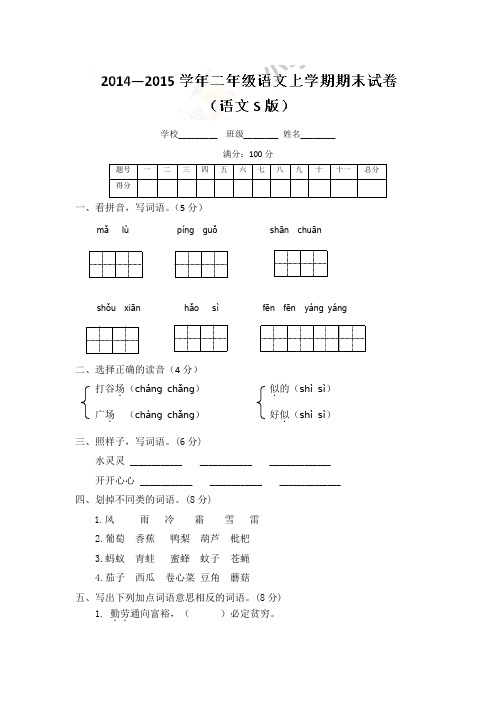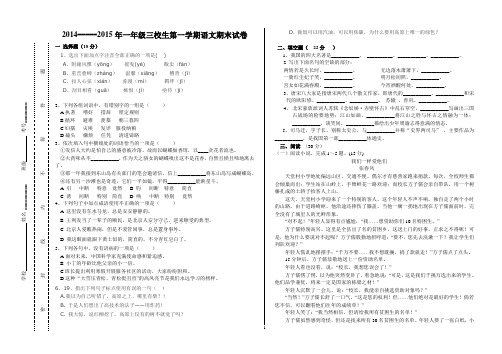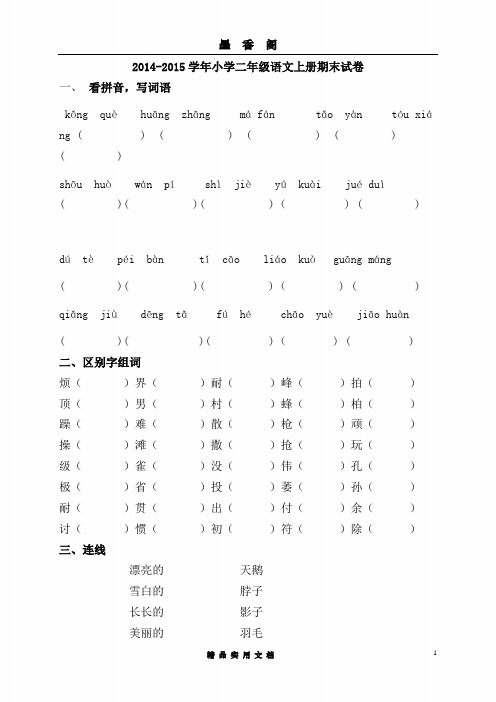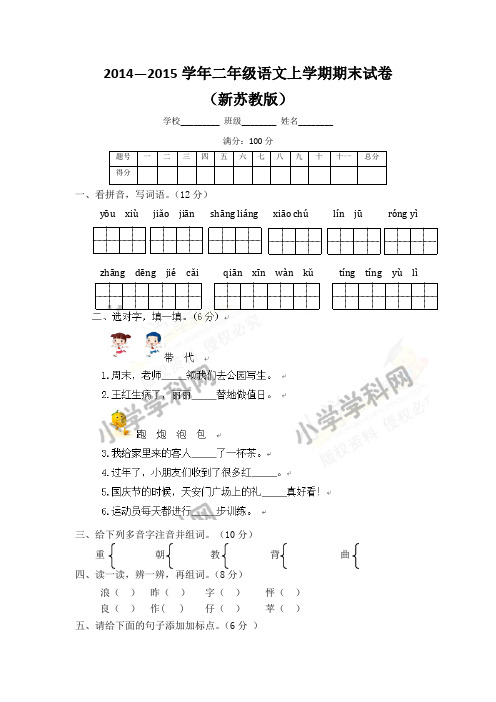2014-2015学年小学二年级上册期末3语文试卷
- 格式:doc
- 大小:171.00 KB
- 文档页数:3

学校_________ 班级________ 姓名________满分:100分题号一二三四五六七八九十十一总分得分一、看拼音,写词语。
(5分)mǎlùpínɡɡuǒshān chuānshǒu xiān hǎo sìfēn fēn yánɡyánɡ二、选择正确的读音(4分)打谷场.(chánɡchǎnɡ)似.的(shìsì)广场.(chánɡchǎnɡ)好似.(shìsì)三、照样子,写词语。
(6分)水灵灵____________ ____________ ______________开开心心____________ ____________ ______________四、划掉不同类的词语。
(8分)1.风雨冷霜雪雷2.葡萄香蕉鸭梨葫芦枇杷3.蚂蚁青蛙蜜蜂蚊子苍蝇4.茄子西瓜卷心菜豆角蘑菇五、写出下列加点词语意思相反的词语。
(8分)1. 勤劳..通向富裕,()必定贫穷。
2. 同学们在认认真真....地写作业。
()3. 虚心使人进步..,骄傲使人()。
4. 阴.对(),守对攻,黑暗..对()。
..对(),战争六、写出带有下列偏旁的字:(6分)女:()()()()虫:()()()()木:()()()()七、将下面的句子改为“把”和“被”字句:(4分)1. 大家团团围住小牛。
把:。
被:。
2. 狂风吹散了天上的乌云。
把:。
被:。
八、查字典(16分)1.“甜”的部首是,它有画,除部首外还有画。
组词()2.“却”的部首是,它有画,除部首外还有画。
组词()3.“房”的部首是,它有画,除部首外还有画。
组词()4.“香”的部首是,它有画,除部首外还有画。
组词()()老师对我说:“没有按时完成作业的孩子不是好孩子。
”()昨天,老师布置我们每人做一篇作业。
()老师说:“这样才是好孩子。
”()结果其它同学都完成了,只有我没有完成。

精品文档,用心整理精品文档,用心整理2013-2014学年小学二年级语文上学期期末考试试卷及答案2013-2014年度二年级上学期语文期末试卷姓名:班级:一、看拼音写词语,相信一定能写得非常好看。
(l0分)二、给带点的字选择正确的读音画“”。
(4分)首都(dōu dū)养分(fèn fēn)转动(zhuàn zhuǎn)漂流(piāo piào)三、我会填。
(21分)1、组词:棋()蛙()颗()洋()旗()洼()棵()扬()秋高()爽五()丰登水到()成雪()送炭四面()方一棵棵()一块块()一条()2、填反义词:美----()快----()危险----()3、词语接龙:父亲---亲人---()---()四、填上部首组成新字,看谁写的多。
(至少写两个)(4分)木包五、加标点。
(2分)1、爷爷买的枣儿真甜啊()2、李华今天怎么没来上课()六、我会查字典。
(3分)“阔”字要查()部首,除去部首还有()画,读音是()七、选词填空。
(2分)漂浮飘扬1、云在空中(),碰到冷风就变成水珠落下来。
2、、彩旗迎风(),广场显得更加美丽。
八、谁和谁可以做朋友呢?连一连吧!(11分)燃烧的人们练二胡勤劳的果子拉雪毯盛开的火把披着书法酸酸的鲜花铺着银装《回乡偶书》桃花潭水深千尺正是橙黄橘绿时《赠汪伦》一年好景君须记笑问客从何处来《赠刘景文》儿童相见不相识不及汪伦送我情十、聪明的你一定能按要求做出下列各题。
(15分)l、写出本学期内学过的你认为最美的词。
(至少写两个)(2分)2、你能写出本学期学过的一句谚语吗?(2分)。
3、写出这学期你学过的一个童话故事题目《》。
(1分)4、写出下面课文中你喜欢的句子。
(6分)《假如》。
《清澈的湖水》。
《欢庆》。
5、一说,哪些动物对人类有益,怎么有益,我们怎样保护它们?(2分)。
6、语文课上,你表演过什么角色?(2分)。
十一、照样子写句子。

北京市西城区2014—2015学年度第一学期期末试卷第二部分:知识运用(共两节,45分)21. They’ve moved to a different house _____ their children can attend a better school.A. in caseB. as long asC. so thatD. even though22. _____ his ID card, Philip had to go to the police station in person and reapply for a new one.A. Having lostB. LosingC. To loseD. Lose23. I believe that the world is _____ you think it is. So smile at the world and it will smile back.A. whatB. howC. thatD. which24. —I was very angry with Kelvin yesterday.—I know your feelings, but if you forgive him, you _____ a bigger man.A. have beenB. would beC. will beD. were25. —What do you do as a volunteer in Africa?—_____! There are many poor people there. They need a lot of help.A. NoneB. SomethingC. LittleD. Everything26. Arriving at the party in a great hurry, we were disappointed to find that the band _____ playing.A. stoppedB. will stopC. has stoppedD. had stopped27. The sign at Gate 8 reads that you _____ show your boarding pass and passport before getting onthe plane.A. canB. mustC. mayD. would28. This ferryboat _____ to transport passengers between the harbor and the island for years.A. is usedB. was being usedC. is being usedD. has been used29. It is becoming a threat to the Chinese language and culture _____ some people can’t writeChinese characters properly.A. whichB. thatC. whetherD. how30. _____ the travelling needs of passengers, China Railway Corporation has decided that peoplecan book tickets 60 days in advance.A. MeetB. To meetC. MetD. Meeting31. The Alibaba Group, _____ was founded in 1999, has become China’s largest e-commercecompany.A. whichB. whatC. whoseD. that32. —Hi, Lucy! What’s the schedule for tomorrow?—Let me check. You _____ an appointment with Thomas at three o’clock.A. haveB. hadC. were havingD. have had33. Peter would have the chance to present his talents in the competition now if he _____ last term.A. signed upB. had signed upC. signs upD. has signed up34. There are 12 lamps hanging _____ the ceiling in the restaurant.A. onB. inC. fromD. around35. In Singapore, people _____ eating or drinking on the subway can be fined up to 500 Singaporedollars.A. having caughtB. catchingC. caughtD. catchCAACD DBDBB AABCC第二节完形填空(共20小题;每小题1.5分,共30分)Each of us struggles for self-respect and self-worth to some degree. I spent much time trying to achieve perfection in every aspect of my life.I was a happy kid with a lot of friends and a supportive family. But growing up was really36 and even scary sometimes.During my childhood, I was constantly involved in something that included people’s viewing my achievements or my 37 . I wanted everyone’s praise and acceptance, but I was my own toughest critic(挑剔的人).After I graduated from high school, my 38 to be “thin” began to trouble me. I began trying to diet by 39 my food.In the beginning, I felt great—attractive and successful, almost superhuman. I even thought that I was better than everyone else. What I di dn’t see was that I was slowly 40 myself.People around me began to 41 my weight loss. They said with concern. “You’re losing too much weight.” “Elisa, you’re so thin.” All their words only suggested that I was getting closer to “42 ” .Sadly, I took my physical 43 the first important in my life, 44 that it was the way to become successful and accepted.Then I cut down my 45 more and more, until a 46 day consisted of half a teaspoon of nonfat yoghurt and coffee in the morning, and a cup of grapes at night.But my poor 47 began to cause me to lose 48 . Then one night, like many nights before, I couldn’t sleep, and my heart felt as though it might beat out of my chest. I tried to49 , but I couldn’t. The beating became so rapid and so strong that I could no longer50 . What I had done to diet nearly caused me to have a heart attack. I stood up, and immediately fell down. I was really 51 , and I knew I needed help. My roommate rushed me to the52 , beginning the long road to my 53 . It took a lot—doctors, nurses, nutritionists, food supplements…And most important, a sense of what was true about myself got back on track with reality. I realized that, with my 54 of trying to be “perfect” on the 55 , I had sacrificed who I was on the inside. What I know now is, we are—each and every one of us—already perfect.36.A. natural B. hard C. easy D. possible37.A. natures B. backgrounds C. failures D. scores38.A. problem B. desire C. way D. promise39.A. collecting B. checking C. controlling D. balancing40.A. killing B. forgetting C. asking D. questioning41.A. help B. accept C. reject D. notice42.A. perfection B. devotion C. destination D. attention43.A. strength B. exercise C. examination D. appearance44.A. believing B. realizing C. pretending D. declaring45.A. expense B. movement C. food D. travel46.A. pleasant B. difficult C. different D. typical47.A. memory B. nutrition C. knowledge D. taste48.A. weight B. h ope C. sleep D. job49.A. walk B. relax C. cry D. talk50.A. breathe B. resist C. wake D. remember51.A. scared B. annoyed C. discouraged D. disappointed52.A. bed B. office C. school D. hospital53.A. glory B. recovery C. discovery D. victory54.A. skill B. decision C. experience D. deal55.A. whole B. face C. mind D. outsideBCBCA DADAC DBCBA ADBCD第三部分:阅读理解(共两节,40分)AWelcome to OysterOyster is a smart card which can hold Pay as you go credit, Travelcard and Bus & Tram(有轨电车) Pass season tickets. It is the cheapest way for you to pay for single journeys on bus, Tube, tram, DLR, London Overground and most National Rail services in London.Pay as you go on your Oyster cardUsing Pay as you go is cheaper than paying cash for most journeys.Daily limitIf you’re unsure of the number of journeys you’re going to make, Oyster pay is easy for you to use. Make as many journeys as you like and you’ll never pay more than the daily limit for the zones you’ve travelled in. Daily limits are calculated over a 24-hour period, covering all the journeys starting between 4:30 and 4:29 the next day. There are different limits for different types of transport and times of day.The system calculates the daily limit based on when and how you travel. Money will be taken away from your card each time you travel, until you reach a daily limit. This includes Pay as you go travel on bus, Tube, tram, London Overground and most National Rail services in London. River services and the Emirates Air Line do not contribute to your daily limit. For more information, visit /oyster.Season tickets on your Oyster cardYou can buy Travelcards and Bus & Tram Passes on Oyster. With a Travelcard, you can travel as many times as you like on bus, Tube, London Overground and National Rail services on the dates, and across the trav el zones you’ve paid for. Please ensure your Travelcard covers all the zones you travel through. If your Travelcard includes zone 3, 4, 5 or 6, you can also use it on tram services. Bus & Tram Passes can be used on trams and London buses displaying the red roundel bus symbol on the dates you’ve paid for.The red roundelWhen you first get an Oyster card, you will need to pay a £5 refundable (可退款的) deposit. If you no longer need your Oyster card, we’ll refund any remain ing pay. Find out more at /refunds.56. What do we know about the daily limit?A. You’ll stop paying once you reach the daily limit.B. River services help contribute to your daily limit.C. The daily limit is fixed no matter when you travel.D. You’ll pay more than the daily limit for your travel.57. Season tickets include _____.A. Oyster card and TravelcardsB. Pay as you go and TravelcardsC. Travelcards and Bus & Tram PassesD. Pay as you go and Bus & Tram Passes58. Where is the text probably taken from?A. A brochure.B. A report.C. A novel.D. An essay.56.A 57.C 58.ABMy morning routine varies little from day to day. I walk the dog, eat breakfast at the kitchen counter with Katie and Matt, and then settle in for a day at the computer. And because I work mostly from home, I have learned that little walks into the outside world are important for psychological well-being. So before I begin attempting to put sentences together, I walk over to a little coffee shop in my neighborhood, and chat with the folks behind the counter.The coffee shop is on the other side of the historic Chesapeaker & Ohio Canal from my house. Whenever in season, tourists line up to take a slow boat, if not to India, at least into the 19th century.One warm day last fall, I turned the corner to see one of the boatmen sitting alone on the boat, bathed in early-morning light. He was playing the violin. The scene stopped me in my tracks. What I witnessed could only be described as a perfect moment. Ten seconds at most. But months later I still remember just standing there, watching, listening, and taking it all in.We all have such moments put before us. Little surprises. Whether we’re wise enough to see them is another thing.I thought of the violin man one Sunday afternoon while reading the biographies of those killed in the Columbia incident. The specialist Laurel Clark, talking from the shuttle a few days before it was to land, said it was blissful to see the simple unexpected wonders of space, like a sunset. “There’s a flash; the whole payload bay turns this rosy pink,” she said. “It only lasts about 15 seconds, and then it’s gone.”I once had a friend who had a strange habit that never stopped to amuse me, maybe because I never quite knew when she was going to spring it on me. It could come in the middle of a particularly lively dinner with old friends. Out of the blue, she’d say, “Stop! I want to remember this moment.” I realize now, after her death, what wise advice that is.59. The author goes out for a walk every day in the morning mainly because _____.A. she needs to walk the dog and enjoy the fresh airB. she considers that it is good for her physical healthC. she hates to be left alone at home when others are outD. she benefits psychologically from contacting the outside world60. The underlined word “blissful” in Paragraph 5 probably means _____.A. enjoyableB. valuableC. agreeableD. reasonable61. The main purpose of the passage is to tell people to _____.A. develop a good habitB. enjoy life to the fullestC. catch the valuable moments in lifeD. be willing to follow friends’ advice62. “I” in the passage is probably a _____.A. violinistB. writerC. sailorD. waitress59.D 60.A 61.C 62.BCA lot of us think that we should visit the dentist every six months. Whether those check-ups are really necessary is, however, a matter of debate. In 2000, three-quarters of dentists surveyed in New York were recommending six-monthly check-ups, despite the absence of evidence. Today, many organizations still recommend six-monthly check-ups. But for several decades some have been arguing that the choice of six months as the ideal space between visits is rather questionable. For example, Aubrey Sheiham, a professor of dental public health, published a paper complaining about the lack of evidence for six-monthly check-ups. Almost 40 years, he’s still making the same point.Last year the Cochrane Collaboration performed a review of the research that had been done and they were disappointed with what they found. The quality and quantity of the research was simply too poor to back up the idea of six-monthly check-ups.There’s something else we have to bear in mind. Even when a study finds, for example, that children who go to the dentist frequently have fewer fillings, there may be other factors(因素) at work. Those same children may have other advantages; they may eat more healthily and have better quality dental equipment.How often should you visit the dentist, then? Bodies like Nice, which provides guidance for the National Health Service in England and Wales, say that the frequency of dental visits all depends on the individual. They recommend that children go at least once a year because their teeth can decay(蛀蚀) faster, while adults without problems can wait as long as two years. They even go as far as to say that longer than two years is OK for people who have shown commitment to caring for their teeth.Where does this leave the rest of us the next time we receive a card in the mail reminding us our next dental visit is due? We’d all like an excuse to go less often, and the good news is that if you don’t have any problems you can probably w ait a little longer than six months between visits. But exactly how long you can wait before your appointment with the dentist’s chair will depend on the assessment you and your dentist make of your own risk.63. Who supports six-monthly dental check-ups?A. All the dentists.B. Many organizations.C. Aubrey Sheiham.D. The National Health Service.64. The research may not prove the idea of six-monthly check-ups because _____.A. the researchers were not qualifiedB. the number of the subjects was bigC. there might be other factors at workD. there was a lack of quality dental equipment65. We can learn from the last two paragraphs that _____.A. people often find excuses to avoid the next dental visitB. the frequency of dental visits varies for different peopleC. people should decide when to go to the dentist by themselvesD. the healthier a person is, the less frequent the dental visits are66. What is the best title for this passage?A. How can we go to the dentist less?B. Why do we need to visit our dentist?C. Who should go to the dentist frequently?D. How often do we need to visit our dentist?63.B 64.C 65.B 66.DDDo we really know our best friends?I like my close friends a lot, and yet, on an almost daily basis, they shocked me. I have a friend who thinks voting is a waste of time; I have another friend who never takes any arrangement to meet at a given time and place seriously.It’s generally held that friends are people with whom we choose to develop relationships because we find their personalities agreeable, or similar to our own, and yet experience regularly contradicts this. What is a friend, really? All that one can safely say is that a friend is someone one likes and wishes to see again.The truth is that we don’t know our friends. Numerous studies show that we tend to assume our friends agree with us more than they really do. The striking part is that the problem doesn’t appear to lessen as a friendship deepens. When the researchers Michael Gill and Bill Swann questioned students sharing rooms, they found that, as time passed, people became even more confident in the accuracy of their judgments about the other, and yet, in reality, the judgments grew no more accurate. Two people might become dear friends, yet remain ignorant about vast areas of each other’s inner lives.This seems strange, until you consider, that many of the benefits that friendship provides don’t necessarily depend on perfect familiarity; they come from something closer to reliability. Friendship may be less about being drawn to someone’s personality than about finding someone willing to keep you company, or lend an ear. A friend provides the “social-identity support” we desire. You needn’t be a close match with someone, nor deeply familiar with their mind. And once a friendship has begun, you want to like it, if only to confirm that you made the right decisi on. We don’t want to know everything about our friends. We don’t base friendships on what we learn about people; we decide what to learn about people, and what to ignore, based on having decided to be friends.Perhaps there’s something moving about viewing friendshipas an agreement to keep each other company, ignore each other’sfaults and not probe (刨根问底) too deeply in ways that mightweaken the friendship. Perhaps a true friend is someone whodoesn’t ask many awkward questions.67. Why does the author tell the stories of his two friends in thefirst paragraph?A. To provide background information.B. To introduce the topic of the passage.C. To stress the importance of friendship.D. To show the difference between friends.68. The underlined word “they” in Paragraph 4 refers to _____.A. friendsB. judgmentsC. researchersD. benefits69. It can be concluded from the passage that _____.A. close friends usually know each other in depthB. real friends are people you like but don’t wish to see oftenC. we do not necessarily share personalities with close friendsD. the longer we stay with friends, the more accurately we judge them70. Which statement about friends will the author probably accept?A. Stay friends but keep a distance.B. It takes a long time to grow an old friend.C. Real friends will tell you when your face is dirty.D. True friends know all about you and still like you.67.B 68.D 69.C 70.A第二节(共5小题;每小题2分,共10分)Real-life Room Escape GamesReal-life room escape games are a type of physical adventure game in which people are locked in a room with other participants and have to use the things in the room to settle a series of puzzles, find clues (线索), and escape the room within a set time limit.The games are based off Escape the Room video games, such as Crimson Room and QP-Shot, created by TAKAGISM Inc. by Toshimitsu Takagi in 2005, in which the player is locked inside a room and must explore his or her surroundings in order to escape. 71 Other inspirations include adventure board games and movies. Real-life room escape games are becoming popular in the United States, Japan, and China. 72 For example, some games require you escape prison cells while others require you escape space stations.73 Soon, they were exported to North America, Asia and Australia. Examples include the two pioneer companies Hint Hunt and Adventure Rooms.The games were so successful that new locations began opening up across China, in cities big and small, according to Want China Times. In the southern city of Shenzhen, for example, the first escape game location opened last August. 74 “These real-life escape games can help those who stay at home on their computers and iPads all day to experience real social circles,” Tian Xiaochuan, who owns two room escape game stores in Jinan, told Want China Times.Earlier this year, The South China Morning Po s t said the real-life escape games are a hit among “highly stressed students and overworked young professionals.” 75 Some players get so involved that they tear down equipment or decorations inside their “prisons”, as Zhu Yumeng, chief operating officer of Beijing room escape game store Taoquan told China Daily.A. Each game adds local themes to settings.B. And seven new game locations quickly followed.C. They should also be brave enough to face their fears.D. Sometimes the excitement becomes a bit much, though.E. Weekend or day event escape games have been held in some stores.F. Permanent real life escape games in a fixed location were first opened in Europe.G. Players must be observant and use their critical thinking skills to escape the room.71.G 72.A 73.F 74.B 75.D第四部分:书面表达(共两节,35分)第一节(15分)你的英国笔友Chris要来北京参加一个汉语冬令营。

12014-----2015年一年级三校生第一学期语文期末试卷一 选择题(18分)1、选出下面加点字注音全部正确的一项是( )A 、附庸风雅(yōng ) 摇曳(yè) 贩卖(fàn )B 、重峦叠嶂(zhàng ) 温馨(xiāng ) 稽查(jī)C 、扣人心弦(xián ) 弥漫(mí) 羁绊(jī)D 、刮目相看(guā) 嫉恨(jí) 亟待(jí)2、下列各组词语中,有错别字的一组是( ) A 执著 嗜好 措辞 厘定规则 B 循环 避难 羡慕 朝三暮四 C 妇孺 灾殃 发详 服役纳粮 D 磕头 嫌烦 任凭 清道辟路3、依次填入句中横线处的词语恰当的一项是( )①发信人大约是怕自己的盛意被冷落,故而以蝴蝶做香饵,以____贪花者流也。
②火药味从不___________,作为天之骄女的蝴蝶嗅出这不是花香,自然且愤且啼地离去了。
③那一年我接到东山岛有关部门的笔会邀请信,信上___________将东山岛写成蝴蝶岛。
④还有另一沙滩也是奇迹,它们一平如镜,平得___________能映星斗。
A 引 中断 特意 竟然 B 钓 间断 特意 简直 C 诱 间断 特别 简直 D 唤 中断 特别 竟然 4、下列句子中加点成语使用不正确的一项是( ) A 这里没有车水马龙....,总是安安静静的。
B 王利发当了一辈子的顺民,是北京人安分守己,逆来顺受.........的典型。
C 北京人爱瞧热闹,但是不爱管闲事,总是置身事外....。
D 我这眼面就跟下黄土似的,简直的,不分青红皂白....了。
5、下列各句中,没有语病的一项是( ) A 面对未来,中国科学家充满使命感和紧迫感。
B 小丁的年龄比他父亲的小一倍。
C 班长提出利用寒假开展服务社区的活动,大家纷纷附和。
D 这种“大雪压青松,青松挺且直”的高风亮节是我们永远学习的榜样。

2014-2015学年小学二年级语文上册期末试卷一、看拼音,写词语kǒng què huāng zhāng má fán tǎo yàn tóu xiáng ( ) ( ) ( ) ( )( )shōu huò wán pí shì jiè yú kuài jué duì( )( )( )( ) ( )dú tè péi bàn tǐ cāo liáo kuò guāng máng( )( )( )( ) ( ) qiǎng jiù dēng tǎ fú hé chāo yuè jiāo huàn( )( )( )( ) ( ) 二、区别字组词烦()界()耐()峰()拍()顶()男()村()蜂()柏()躁()难()散()枪()顽()操()滩()撒()抢()玩()级()雀()没()伟()孔()极()省()投()萎()孙()耐()贯()出()付()余()讨()惯()初()符()除()三、连线漂亮的天鹅雪白的脖子长长的影子美丽的羽毛四、偏旁加字组词兆()()采()()白()()良()()主()()介()()而()()页()()寸()()余()()方()()各()()五、成语填空()群结()一()不()()()凛冽无()无()年年()()()()勃勃心事()()()家()户()()凡响喜气()()敲敲()()()()围坐张()结()()寒地()千()万()除()迎()聚()()神()高()烈()真价()()()不忘()价之()()姿百()()()通明()颜()色六、多音字hái ( ) quān( )还 huán( ) 圈 juàn( ) shěng( ) sǎ ( )省 xǐng( ) 撒 sā ( )七、选字填空(7分)①拍投抓打扔扣()球()手()水()小鸡()篮()口袋②选词填空苍翠洁白辽阔清清茂密灿烂()的云朵()的小溪()的阳光()绿茵()的牧场()的森林八、句子1、造句……正在…………像……马马虎虎……一丝不苟……2、按照要求把下面两句话综合成一句话(1)这条裤子短。

2014—2015学年二年级语文上学期期末试卷(新苏教版)学校_________ 班级________ 姓名________满分:100分题号一二三四五六七八九十十一总分得分一、看拼音,写词语。
(12分)yōu xiù jiǎo jiān shāng liáng xiāo chú lín jū róng yìzhāng dēng jiécǎi qiān xīn wàn kǔtíng tíng yù lì三、给下列多音字注音并组词。
(10分)重朝教背曲四、读一读,辨一辨,再组词。
(8分)浪()昨()字()怦()良()作( ) 仔()苹()五、请给下面的句子添加加标点。
(6分)1.你知道大海有多深吗()2.秋天的枫叶好美啊()3.这个周末()我要和妈妈去少年宫()4.老奶奶说()谢谢你扶我过马路()七、擦亮眼睛,排列句子。
(5分)()经过勤学苦练,梅兰芳终于成为世界闻名的京剧大师。
()人们都说,梅兰芳的眼睛会说话了。
()他常常盯着空中飞翔的鸽子,或者注视水底游动的鱼儿。
()梅兰芳学艺的决心没有动摇。
()日子一长,他的双眼渐渐灵活起来。
九、阅读短文,完成练习。
(20分)(一)课文片段禹下决心要治理洪水。
他吃尽了千辛万苦,走遍了千山万水,仔细地察看水流和地形。
他带领老百姓挖通了九条大河,劈开了九座大山,引导洪水流入了大海。
禹在外治水13年,曾经三次路过自己的家门,但他一次也没有进去看一看。
禹的儿子十多岁了,还不知道父亲是个什么样子。
洪水被制服了,老百姓过上了安定的日子,大家非常感激这位治水的伟大英雄。
从此大禹的名字代代相传。
1. 这段话共有()句。
(2分)2. 请你为短文选择一个最恰当的题目。
()(2分)A.伟大的英雄——大禹B. 论怎样治水C.大禹治水3. 大禹的儿子十多岁了,为什么还不知道父亲是什么样子?()(2分)A.因为大禹不喜欢回家看儿子。
苏教版二年级语文上册期末试卷分析(2015——2016学年度)上学期万兴乡中心学校二年级阅卷组2016年1月10日苏教版二年级语文上册期末试卷分析一、试卷分析本次的语文试卷共六道大题(一、拼音王国。
二、词语乐园。
三、句子训练营地。
四、按课文内容填空。
五、阅读短文,回答问题。
六、看图写话。
)整个试题基本体现了:注重基础,突出能力,尊重个性,鼓励创新,联系生活的原则。
1、重基础知识和能力的培养试题主要从字词句段、古诗等方面命题,基本技能则是从字词理解,文章感悟等方面考查,无论是广度还是深度,都很好地涵盖了基础知识和基本技能的要点,因此能客观准确地检测出学生的语文能力。
2、强调了语言的积累学生充分积累语言,能夯实学生的文化底蕴,打好语言基础。
3、阅读重点考查学生的阅读能力4、写话重生活性语文来自于生活,语文的学习最终服务于生活。
本次写话选材接近孩子们的生活。
二、取得成绩及学生答题情况分析:(一)全乡整体情况应考人数192人,实考人数192人。
总分13918分,总体平均分71.84,及格率78.14,优秀率50.65,全科合格率69.913,三项平均66.87。
与期中考试相比,进步很小。
(平均分71.5,及格率76,优秀率53,全科合格率73.44)。
与上年县平均相比,差距很大(平均分78.98,及格率90.91,优秀率64.28,全科合格率85.65)。
平均分低于县平均7.14个百分点,及格率低于县平均12.77个百分点,优秀率低于县平均13.63个百分点,全科合格率低于县平均15.737个百分点。
由此看来,需要二年级教师加倍努力,争取缩短与县统测的差距。
从学生完成试卷的情况来看,学生在看拼音写词语、句子等题,失分少,只有个别学生字词掌握不牢,出现错字现象,还有个别学生不够认真。
1、看拼音写词语这一题,如“优秀”的“优”;“商量”的“商”;“神州”的“州”;“盘旋”的“旋”;“追逐”容易写颠倒。
2、大写字母排序。
人教版小学二年级语文上册期末试卷一(一)、看拼音,写词语。
(8分)huān jìng zǐxìzāi hài yōng bào ()()()()gūniáng xiūxīyǔzhîu bōlàng()( ) () ( ) (二)、在划线字正确的音节下面打“√”。
(9分)兴(xīng xìng)奋欢乐(lâyuâ)淹没(mîmãi)漂(piào piāo)流弯曲(qūqǔ)好(hǎo hào)奇上当(dàng dāng)首都(dōu dū)背(bēi bâi)课文(三)、填写正确的字。
(8分)一()树一()鱼一()马一()衣服一把()一盘()一张()一头()(四)、比一比,再组词。
(8分)区( ) 坏( ) 休( ) 吸( )巨( ) 怀( ) 体( ) 极( )云( ) 可( ) 己( ) 京( )运( ) 河( ) 记( ) 景( ) (五)、写意思相反的词语。
(8分)爱—丑—伤心—虚假—多—黑—饥寒—复杂—(六)、照样子写出意思相近的词语。
(4分)例:连忙—赶紧著名—()漂亮—()特别—()立刻—()(七)、补充成语。
(8分)( )高( )淡( )谷( )登坐( )观( ) 自( )自( ) ( )收( )藏( )军( )马十( )十( ) 无( )无( )(八)、连一连。
(12分)1、学电脑梳理羽毛做图案观赏旗帜拼作业挥舞风景2、欢快的阳光认认真真地走路先进的脚步急急忙忙地上课温暖的科技吞吞吐吐地说话(九)、给句子加上正确的标点。
(3分)1、窗外那棵树上有一只小鸟在唱歌()2、明天你能和我一起去小刚家吗()3、天空的云朵一会儿像小鸡,一会儿像小马,多么好看啊()(十)、照样子写句子。
(6分)1、湖水像一面镜子。
_____________________像_________________________________。
2023-2024学年山东省青岛市莱西市二年级(上)期末语文试卷1.请给机票上加点的字标上拼音。
(1)(2)(3)(4)亲近动物朋友。
2.动物名片被小迷糊弄乱了,请你整理好。
(只写序号)①蚜②燕③雁④鹊⑤蜂⑥雀⑦锋⑧芽孔大虫喜蜜3.请你把动物送进成语里。
(只写序号)①龙②狗③鱼④虎⑤鼠⑥狐⑦鸟⑧鸡漏网之惊弓之假威胆小如飞凤舞鸣吠4.阅读资料,选出正确的字或读音。
寒号(hào háo)鸟不是鸟,而是一种鼯鼠。
它会在崖缝里铺(pù pū)上树叶等当(dàng dāng)作窝。
每当(dàng dāng)夜(慕幕)降临,寒号鸟才会出来找吃的。
它还很爱干(gān gàn)净,不管在(那哪)里,总要回到固定的洞穴大便。
5.借助拼音写生字,帮小兔子完成日记。
jīn天天气qíng lǎng,我吃完饭yǐ hòu ,就在妈妈的dài lǐng下出门sàn bù 。
走到菜yuán 的shí hou ,我们看到lín jū山羊爷爷dài 着一顶yuán 形的太阳帽,zhèng zài 给nán guā苗松土,汗水yǐjīng湿透了他的yī fu ,他仍然干得很起劲儿。
劳动虽然xīn kǔ,但收获总是令人huān lè 。
6.要离开动物园了,请你写一幅书法作品留在动物园。
人和动物是朋友走进句子百花园。
7.读一读,选一选。
(只写序号)①三言两语②甜言蜜语③一言不发④自言自语(1)这件事很复杂zá,说不清楚chǔ。
(2)小朋友们千万不能听信陌mò生人的。
8.读一读,选一选。
(只写序号)①微风习习②电闪雷鸣③冰天雪地④云雾缭liáo绕(1)夏天的傍晚,,小朋友害怕极了。
(2)高高的山顶,仿佛人间仙境一般。
2014—2015学年二年级语文上学期期末试卷(人教版)学校_________ 班级________ 姓名________满分:100分一、看拼音,写词语。
(5分)qiān bǐ zhù fú wēn nuǎn bìng chuáng cāo chǎngqíguài shíhòu róng yìyǐ jīng bá cǎo二、为加点字选择正确的读音。
(4分)wéi wèi1.为.了()大家,他宁愿多干一些活。
2.孩子如果已经长大,就得告别妈妈,四海为.()家。
piāo piào3.这朵花真漂.()亮。
4.黄树叶漂.()在水上。
三、填写组词真有趣。
(6分)①柏白(白色)傍()歌()②包饱(温饱)及()分()③还怀(怀念)哇()请()四、填写正确的词语。
(8分)一()树一()鱼一()马一()衣服一把()一盘()一张()一头()五、把下列成语补充完整。
(8分)( ) ( )为家 ( )谷( )登坐( )观( ) 自( )自( )( )全( )美迫( )( )待五( )六( ) 三( )二( )六、把合适的搭配用线连接起来。
(3分)欢快的阳光认认真真地走路先进的脚步急急忙忙地上课温暖的科技吞吞吐吐地说话七、按要求写句子。
(6分)1.湖水像一面镜子。
__________________像____________________________。
2.嫦娥奔月是神话故事,女娲补天也是神话故事。
__________是______________, __________也是________________。
3.例:妹妹把杯子里的牛奶喝光了。
杯子里的牛奶被妹妹喝光了。
小红把小树苗埋在了树坑里。
______________________________________________________________。
人教版语文二年级上册期末测试题
一、我会选择正确的读音打“____”(8分)
1.今天,我还(h ái hu án )要去他家还(h ái hu án )书。
2.大海奏起欢乐(yu â l â)的乐(yu â l â)曲。
二、我能正确拼读词语,并能把字写好。
(10分) ji ào sh ì z ǐ x ì m ín z ú b ō l àng xi ū xi
t án q ín y ōng b à
o h ú li y ǎn j īng zh ù f ú
三、我会写同音字。
(10分) (
)贵 ( )泳 ( )己
( )体 吃( ) (
)卫 ( )其 写( )
( )手 已( ) 四、我会选词填空。
(12分)
1.河水( )向前流着,四周一片安宁。
2.( ),人们发现了他的弱点。
3.她( )把铅笔屑扫走了。
五、我会填。
(8分)
1. ,正是橙黄橘绿时。
2.停车坐爱枫林晚, 。
六、我会按要求写句子。
(12分)
b ǎo
y óu
z ì
sh ēn
j īng
1.小猴子爬上葡萄架。
(迫不及待地)(扩句)(4分)
2.叶子上的虫还用治?(换种说法,意思不变。
)(4分)
3.北京立刻变成了
...欢乐的海洋。
(用加点词语写句子)(4分)变成了
七、阅读理解。
(20分)
(一)课内语段阅读。
(8分)
中华世纪坛人如海,歌如潮。
人们相互击掌,相互拥抱,任激动的泪水尽情流淌。
江泽民主席等国家领导人来到欢乐的人群中,与大家同欢呼,共歌唱,把庆祝活动推向高潮。
1.这段话共写了有句话。
(2分)
2.这一段写了人们在庆祝申奥活动。
(3分)
3.江泽民主席做了些什么?(3分)
(二)课外阅读。
(12分)
晚饭后,我和姐姐正在门口乘凉。
忽然飞来一只大蜻蜓,落在一棵小树上,我悄悄地跑去,把它捉住。
大蜻蜓真漂亮!两只眼珠像小玻璃球,亮晶晶的。
一对红翅膀不住地扇着。
我真喜欢它,就拿着玩起来。
姐姐看见了,大声喊:“快把它放了,它是益虫!”我听了姐姐的话,想到益虫的好处,就把它放了。
1.第一自然段共有句话。
(2分)
2.我能从文中找出下面词语的近义词。
(4分)
美丽——()喜爱——()3.用“”画出描写蜻蜓外形的句子(3分) 4.我非常喜欢大蜻蜓,为什么又把它放了?(3分)
八、看图写话乐园。
(20分)。